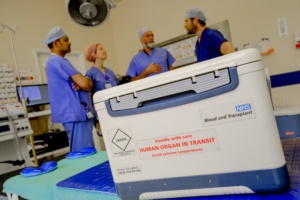Black families’ reluctance to talk about organ donation is contributing to deaths amongst black people waiting for a transplant.

Although many black and Asian patients are able to receive a transplant from a white donor, for many the best match will come from a donor from the same ethnic background. Blood and tissue types need to match for a successful transplant and organs from people from the same ethnic background are more likely to be a close match.
However only 25% of black people have told their family they want to be an organ donor compared with almost half (49%) of all adults in England, an NHS Blood and Transplant Survey has found.
NHS Blood and Transplant has revealed the figures to mark Organ Donation Week on September 4 to 10 and is urging people to tell their families they want to become lifesaving organ donors.
Anthony Clarkson, Assistant Director of Organ Donation for NHS Blood and Transplant, said: “Because people from the same ethnic background are more likely to be a match, more black lives would be saved if more black people donated.
“We know that black families are less likely to discuss organ donation and are much more likely to decline to donate organs for lifesaving transplants.
“Last year 470 people died while waiting for a transplant or within one year of removal, and of these, 26 people were black. If more black people decided to be donors and shared their decision with their families more lives would be saved.
“This Organ Donation Week, please tell your family you want to save lives. A few words now can make an extraordinary difference.
“If you want to be a donor, your family’s support is still needed for donation to go ahead, even if you are on the NHS Organ Donor Register.
“If you are unsure about donation, please ask yourselves as a family: what would you do if one of you needed a transplant? Would you accept a lifesaving organ? If you’d take an organ, shouldn’t you be prepared to donate?”
Black and Asian patients are over-represented on the waiting list. More than a quarter (29%) of patients in need of a transplant are from these communities. They are more likely to need an organ transplant than the rest of the population as they are more susceptible to illnesses such as diabetes and hypertension, which could result in organ failure.
Currently only 35% of black and Asian families agree to donate when asked in hospitals. There are a range of perceived barriers that vary between different faith and communities. For example some people worry that doctors will not try to save the life of a potential donor. There may be specific concerns over religious or cultural practices.
NHS Blood and Transplant can reassure people: It is always the priority of the treating medical team to save a patient’s life. It is only when the treating medical team in the hospital and the family have accepted that no further treatment can help, and it is not in the patient’s best interest, that end of life care choices are considered.
The major religions in the UK support the idea of organ donation and transplantation.
Organ donation is a highly controlled area and is regulated by the Human Tissue Authority. The sale of human organs or tissue is illegal in the UK.
Kindly follow us on twitter:@AfricanVoice2








